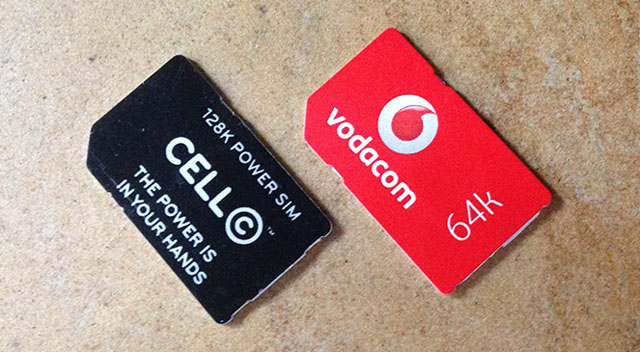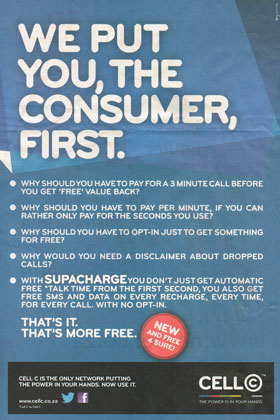
Vodacom is stepping up its war with Cell C, launching a new radio advertisement that takes aggressive aim at the smaller operator’s new Supacharge prepaid airtime plans.
At the same time, Cell C is taking aim at Vodacom in a new print media campaign that questions its bigger rival’s tariff plans.
Vodacom’s radio ad (listen to it below) may constitute comparative advertising, according to an advertising industry executive, and without doubt signifies an escalation of simmering hostility between the two mobile operators.
In return, Cell C appears to have no qualms about sticking it to its bigger rival. In newspaper ads published on Sunday, it poses questions clearly aimed at luring away Vodacom customers. “Why should you have to pay for a three-minute call before you get ‘free’ value back?” it asks. “Why should you have to pay per minute if you can rather only pay for the seconds you use?”
Cell C chief commercial officer Jose Dos Santos said recently that his company wants to launch comparative advertising campaigns targeted at its bigger rivals, MTN and Vodacom, and is frustrated that it is unable to do so.

South Africa’s Trade Marks Act prohibits the use of other companies’ trademarks in advertising, making direct comparative advertising almost impossible.
At the end of January, Cell C unveiled the Supacharge prepaid plans, which give customers free Cell C-to-Cell C voice calls, SMSes and data each time they recharge. If they top up with R500 or more, they are even offered unlimited on-network calls for a period of 30 days, along with a thousand SMSes and 1GB of data.
Vodacom retaliated barely a week later by reducing the cost of voice calls to R1,20/minute on per-minute billing. That’s still more expensive than Cell C’s 99c/minute on per-second billing, but the operator also allows customers who pay for a three-minute on-net call to have the rest of the hour free.
Now, Vodacom is stepping up the war — at least on the marketing front. Its new radio ad takes direct aim at Cell C’s Supacharge plans.
The first half of the 45-second ad says:
The word “super” is great in front of the word “hot” when you’re using it to describe your new girlfriend. Va-va-voom. “Super” is awesome when it’s in front of spicy and you’re praising your auntie’s vindaloo. But “super” is not so awesome when it’s in front of “charged”, as in “super charged”, which you might feel is what your cellphone company has done to you, in which case “super charged” leaves you feeling, well, overcharged. Luckily with Vodacom’s daily free calls prepaid price plan, you pay for the first three minutes and get the next 57 minutes free. That’s Free4Sho.”
Listen to Vodacom’s ad:
[audio: https://techcentral.co.za/wp-content/audio/vodacom-ad.mp3]Justin McCarthy, group MD at TBWA\Hunt\Lascaris in Durban and a director of the Association for Communication and Advertising, an advertising industry self-regulatory body, says it appears that Vodacom’s intent with the ad is to be comparative.
Asked if Cell C would have grounds to lay a complaint against Vodacom at the Advertising Standards Authority, McCarthy says: “Without studying the campaign, the only grounds evident to me would be exploitation of advertising goodwill — in this case the Cell C product name Supacharge — but Cell C would need to be able to demonstrate that it has built equity in that product over time and with sufficient investment for it to be readily recognisable as a Cell C property in the mind of the hypothetical reasonable man.
“As this is radio and therefore no written version of the product name is visible, the complainant would have to argue intent without reference to the way the product is written — in other words, is it a deliberate copy of Supacharge, or is it merely reference to the words ‘super charge’ in the common-use sense. On the evidence, I would say Cell C would not have a strong case.” — (c) 2013 NewsCentral Media




